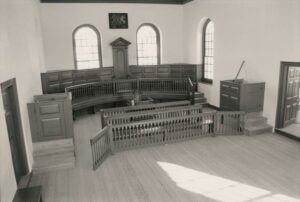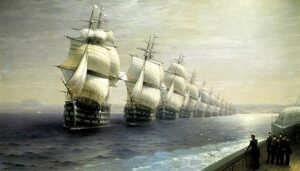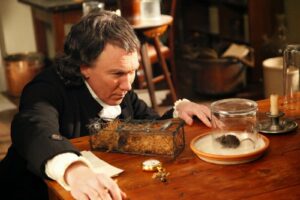Americanism Redux
September 28, your today, on the journey to the American Founding, 250 years ago, in 1773
The ties that bring us together. They bind. They break. They are a physical presence. They are a metaphysical moment.
* * * * * * *
The door to her jail cell opens. Hagar, the black woman of unknown age, walks out of her cell, a sheriff from the eastern shore of Maryland leads the way into the courtroom.
Hagar has been found guilty of attempting to murder a white man. She’s been in jail for a few weeks, waiting for the final decision as to her punishment. Whatever the five white judges of Queen Anne County decide and confirm now, it’s certain to be severe and unbearable. It could also be death.
Hagar stands before the judges. The men in robes and gray wigs begin to speak. Their tones are serious, their words are somber. Hagar listens.
“Know ye that of our special Graces we have pardoned unto Negro Hagar…as proper Object of our mercy…(she) not having the fear of God before her Eyes but being moved and seduced by the Instigations of the Devil…”
In other words, she will suffer no punishment for attempted murder. The sheriff releases Hagar from jail. Something in the investigation about the black woman and the white man had been uncovered that caused the judges to let her go. No one wrote anything down about the discovered story. It is enough for them to know the context and to surround it with a spiritual meaning.
* * * * * * *
As Hagar disappears from the jail and courtroom, the colonial capital of Maryland, Annapolis, on the western shore of the Chesapeake Bay, is host to two strikingly different experiences involving the human head. John McGinnis, dental surgeon, is in town for a short visit from Europe. He’ll use his miraculous treatment for scurvy of your gums and, for a limited time only, a gleaming white enamel that he’ll wipe over your teeth. Consider this next as reward for your effort—once you’re done with Mr. McGinnis, you’ll be ready for Mr. Wall, who is in Annapolis with his new show of humor formerly seen in New York City and Philadelphia. Wall’s show will be a “Lecture On Heads”, complete with special visual and lighting effects to go with hilarious head-oriented skits about married couples, rich women, various ethnic groups, and “modern English politics”. What better way to celebrate a clean mouth than with an outburst of genuine laughter? Go to the dentist and then go to the comedy club.
* * * * * * *
Farther west, on the other side of the Allegheny and Blue Ridge Mountains, is a man with teeth in God-only-knows-what condition. He squints more than he smiles. He stands near where a creek joins the Ohio River. Holes have been scooped out up and down the creek bank. Peculiar, he thinks to himself. The holes have been made by Lenape men, women, and children known to come here to this spot to dig in the clay soil. They fill baskets with the clay to make pipes for smoking tobacco back in their Native villages. They’ll trade the clay pipes to other tribes. About an hour’s walk from the scooped-out holes of Pipe Creek the Adena people, generations ago, shaped a mound from the soil around them.
Michael Cresap, the man standing on the creek bank, likes the look of the land around him. He’ll kill for it, which he’s done before, and won’t hesitate to do again. He knows another colonist, Dr. John Briscoe, tried to live here a few months ago but moved away, back to a more settled life. He’s also heard that a wealthy Virginian officer from the French and Indian War, a tall man named Washington, is supposed to have land claims here. Cresap doesn’t care. Let the Virginian assert himself in person. Cresap will be ready for him. In the meantime, maybe he’ll scoop out enough clay to make a pipe for smoking as he waits, squinting at the sun.
(a house that Cresap built)
Also
Off the coast of England, seven ships are underway in their journey to America while another ship makes ready to sail. The cargo on board each of the seven-plus-one group have a mysterious, invisible connection.
The seven ships are a day west of the coast, roughly one hundred miles on their way to the colonies. Aboard them are, collectively, 2,000 chests of Chinese tea, most of it black but some of it green. Inside the chests the tea sits in countless brick-like forms, ready for claiming, distributing, selling, and consuming.
The ships are bound for four colonial ports—Boston, New York, Philadelphia, and Charleston. The chests are the property of the East India Company, object of a year-long governmental and political effort, half wrestling match and half palm-greasing deals. EIC’s officials breathe a little easier. They’re “too big to fail” and now with the tea headed to America and a semi-enforced monopoly on the colonists’ most popular daily product, life seems a bit more predictable as well as profitable.
The news of the Tea Act has already landed in the British colonies. Still, reading about something is not the same as holding something in your hand, seeing it on a dock, watching it carried from place to place under the gaze of people who are linked to the substance. No, information about a thing is quite different than the materiality of a thing currently riding on seven ships in the ocean one day west of England.
On another ship, not quite prepared to sail but soon to be plowing through the salt water, a particular passenger will sigh as he departs England. He is Benjamin Franklin and the private letters written by Massachusetts Governor Thomas Hutchinson and Lieutenant Governor Andrew Oliver that he leaked months ago have enflamed the pro-colonial rights movement in Boston, eastern Massachusetts, and much of New England. Hutchinson and Oliver are under pressure to resign or face impeachment by the colonial legislature. The effect of Franklin’s leaked letters have rippled as far down the Atlantic coast as South Carolina and Georgia, following the new nodes called the Committees of Correspondence set up in each colony.
Franklin reads a letter of goodbye from a dear friend, Dr. Joseph Priestley, who updates Franklin on his latest chemical and environmental experiments. Franklin will deeply miss this type of intellectual conversation and relationship. He loves the status and identity of British citizenship, embodiment of the rights and liberties gained and retained over centuries of work and strife between people and ruler, a symbol of comparative freedom on a chaotic planet.
The seven ships of tea are ahead of the one ship of Franklin. As seven-plus-one, they travel the watery bridge between two worlds. Atop the bridge and through the ocean spray moves a change of policy, a change of practice, a change of plans.
(friend of Franklin, Joseph Priestley)
For You Now
At this moment, you live your life while other people do the same. A larger story comes when a connection forms, visibly or invisibly, between your life and other lives. What connection can be found between you and, say, a dozen other people living right now elsewhere in the United States? And in that connection can we find the hint of what is to come in Year 250, in 2026 when a light shines backward into the past and we see the state of the nation and its future?
For today’s entry we say farewell to Hagar. Her history, those pieces of things remembered for some reason, ends. No more is known, a vanishing into the ever-growing nothingness of past lost and forgotten that sooner or later consumes much, most, and many of us. The final intriguing moment belongs to a gap of time between her actions against a man and the final decision of her judgers. We are also left with the decision and its nature. Her deciders—not her accusers—choose to wrap the ruling and the episode in spiritual cloth. The time in between action and punishment was a growing ground. A seed flowered into a pardon, and the pardon was a display.
Cresap tells you of another part of the colonial world. We’re seeing rising tensions and troubles along the broad valley of the Ohio. Overall, this general condition has existed since Europeans arrived in the late fifteenth century. Ever since, in writhing shapes and shifting lines, it has changed with only one true constant—grown inland. Behind the condition, however, new elements are also arriving. Some are concrete and firm to the touch, like the clay that makes the pipes. Some are ideas and beliefs that can’t be touched but which have power and force, just the same. One expression of them will come a decade or so into the future when Thomas Jefferson, who is among the shapers of the Ohio valley, writes and judges of Cresap, calling him “murderer.”
The human head has a couple of unusual stories to tell, at least in Annapolis. It’s a theme and target of humor for a comedian performing to a crowd. It’s a source of pain and discomfort and the search for relief of both. While all the other things are being true—the tales of Hagar and Cresap and eight vessels ocean-going or ocean-bound—a bodily symbol of our humanity, our heads, is reminder of the countless ways in which life takes its course on a daily basis. Laughter lives, and so does suffering.
Speaking of those eight vessels.
As I’ve said probably too often for your taste, those eight vessels are sailing the waters right now in our world. They carry a result, flawed and imperfect, to a significant question that transcends portions. The result arrives and a reaction begins. The reaction overlays what is already here but also reshapes it into something else. A cycle of spinning begins.
This is where we are.
Suggestion
Take a moment to consider: how does the prospect of something big suddenly happening in our American lives feel to you?













